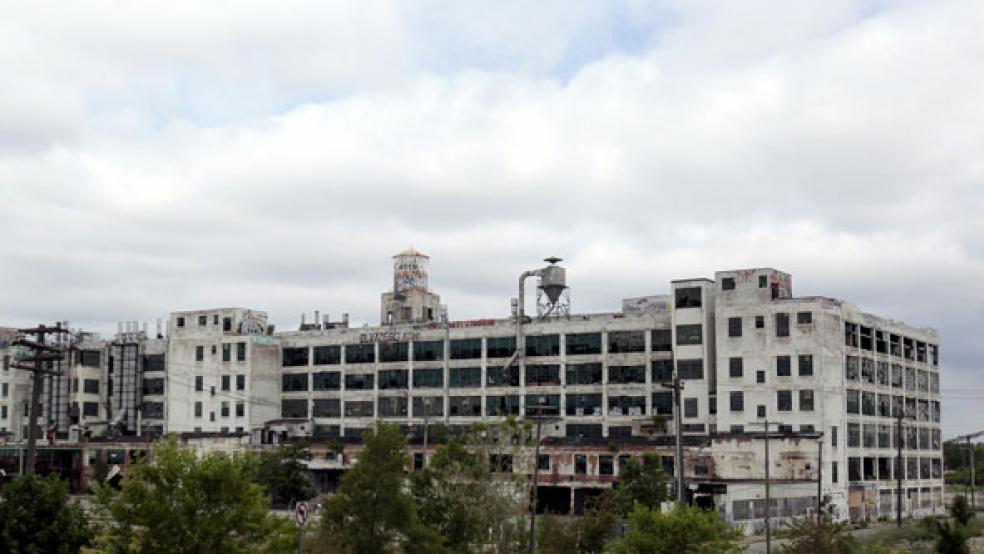President Obama is extremely keen on infrastructure spending. For months, he has toured the country, touting new investment in roads and airports. In St. Paul, he recently said, “Rebuilding our infrastructure is vital to business. It creates good-paying jobs that by the way cannot be outsourced.”
Why, then, is the Obama administration standing in front of the nearly funded $3.65 billion U.S. - Canada Bridge? The White House is balking at providing $250 million for a customs plaza essential to the building of the proposed project linking Detroit and Windsor, Ontario - a project that could assist the recovery of a major bankrupt city, providing jobs and boosting growth. Some charge President Obama with petty politics; others suggest annoyance with Canada. Neither reads well.
Related: Detroit’s 60-Year Decline Into Bankruptcy Hell
It is not a matter of money. Most of the construction costs of the bridge have been arranged by Canada, from combined government and private sources. Nor is it a bureaucratic impasse. The Obama administration approved the project a year ago. Local politicians are in favor of the bridge, which would speed the flow of goods across our second-busiest trade crossing. According to The Wall Street Journal, Canadian exporters say the heavily trafficked bridge now in use creates costly delays and bottlenecks, and building the new route is considered a top priority.
Nonetheless, customs officials and the GSA have informed Michigan legislators and the Canadian government that the $250 million needed to build a customs plaza will not be available, even though the White House budget has set aside $420 million for just such undertakings. Instead of sending those funds to Detroit, the GSA has indicated that it will pay for projects in California and New York.
This is not the first time the Obama administration has disappointed those trying to turn around Detroit. People close to the rescue effort, who declined to speak on the record for fear of making a bad situation worse, say the White House has frequently balked when asked for approvals or funding that might assist Detroit’s rescue. Though last September the White House pledged to help “in every way possible” and put together a package of private and federal grants valued at around $300 million, little assistance has been forthcoming.
There are numerous reasons for the Obama administration to tread carefully. Many U.S. cities are in trouble, and the federal government should rightly demand that local authorities sort out municipal problems. There is certainly a moral suasion problem--the federal government should not bail out local politicians who buy their offices by making unsustainable promises to municipal workers or who fail to raise the revenues needed to keep their cities solvent.
Related: Detroit Faces Bond Challenge in Bankruptcy Plan
For these reasons, and because Republicans in Congress would never agree, a bailout was never in the cards. But, some observers think the Obama administration could have done more. The recently announced “manufacturing institute” proposed by the White House for the Detroit area, using $70 million of federal money, seems like small beans. For some residents in Detroit, the tepid assistance coming from Washington is infuriating. JoAnn Watson, Detroit Councilwoman, famously demanded that Obama bring home some “bacon”, pointing out that “Our people in an overwhelming way supported the re-election of this president, and there ought to be a quid-pro-quo…”
Some suspect that the White House is reluctant to help out Michigan’s Republican governor, whose political fortunes are inextricably linked to Detroit’s progress. As Rick Snyder said at a recent meeting held by the Manhattan Institute, he will forever be known as the governor who precipitated the largest municipal bankruptcy in the country’s history. At the moment, Snyder is looking pretty good. Unemployment in Detroit is at a 6-year low, with job additions among the highest in the nation.
Housing prices in February, according to RE/MAX, were up 35.8 percent from February 2013 – the best rate of gain in the country. Progress has been such that Snyder is considered a possible presidential candidate in 2016. He first has to win reelection as governor, but though the race is close, he has mostly stayed in front of his Democrat challenger.
Related: Government Pensions Under Fire Once Again
Snyder is viewed as a middle-of-the-road problem-solver, which could play well in a country weary of partisan politics. (It certainly played well in the election of Mr. Obama, who promised to bring the country together but who has instead created the most polarized electorate in our history.) He’s not a Beltway insider, but rather a self-made businessman who promised to attract investment and jobs to Michigan. He calls himself “One Tough Nerd” – a pleasing depiction for those of us tired of our president’s eternal quest for “cool.”
Snyder’s claims of lower taxes, reduced deficits and higher job creation are typical of the campaign messages being aired by numerous GOP governors running for reelection – and possibly for president in 2016. Republicans currently occupy governors’ seats in 29 states; many of those states have attracted above-average growth through lower taxes and spending. Rick Snyder, John Kasich, Rick Perry, Scott Walker, Chris Christie – all these contenders have built strong credentials as managers.
Perhaps the White House has refused to fund the Canada Bridge to undermine Snyder’s reelection campaign, or to avoid boosting Snyder’s accomplishments and, by inference, the GOP brand. Some think the Bridge impasse stems from Obama’s annoyance with Canada for pressing him to approve the KeystoneXL Pipeline. It is also possible that Obama is wary of linking arms with those ready to clip the pensions and benefits of Detroit’s municipal unions. That workers’ benefits will come under the knife is unquestioned; the president, however, does not need to be seen in the operating room.
Whatever the cause, the decision is unfortunate and should be reversed.
Top Reads from The Fiscal Times:






